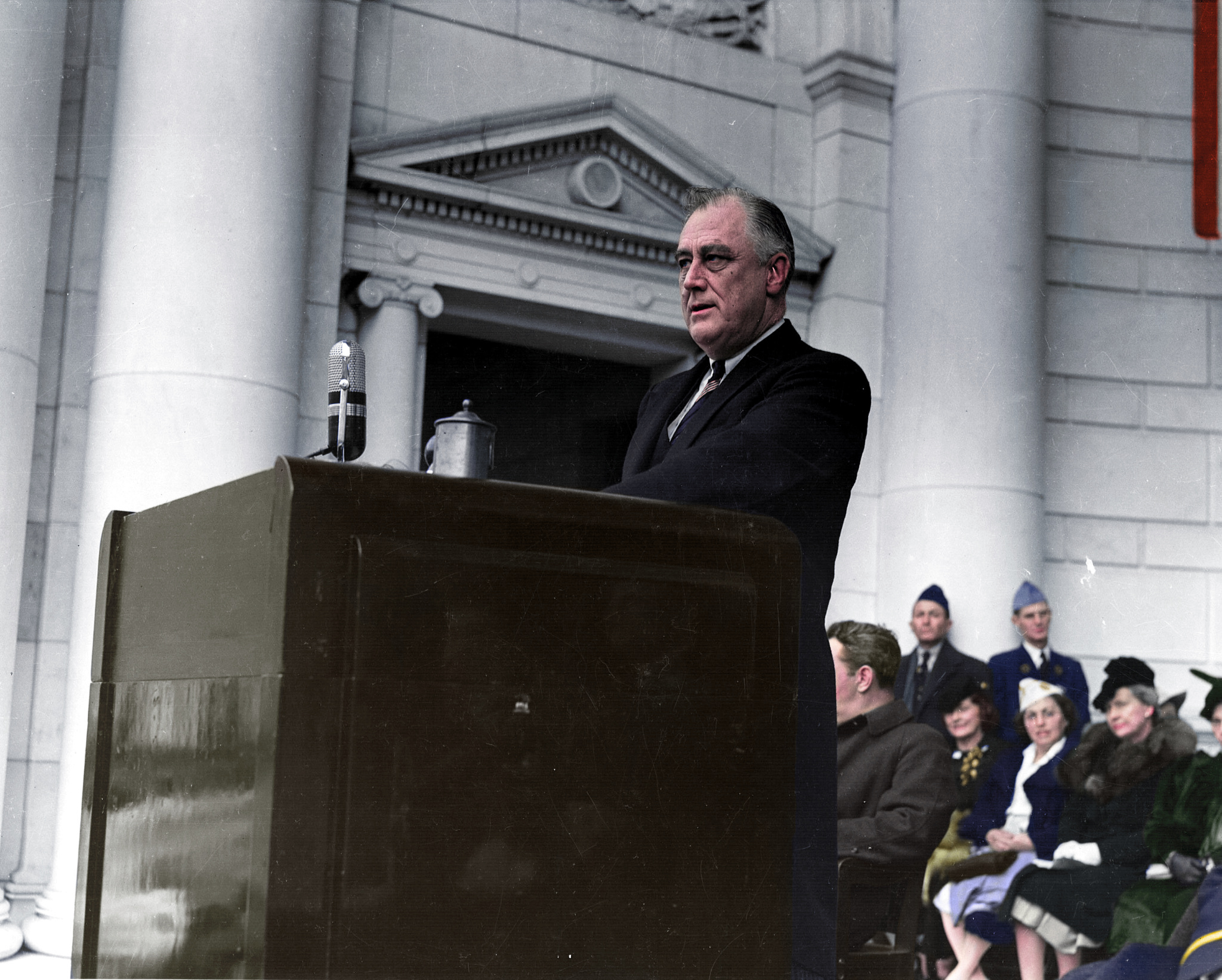President Roosevelt’s address at the Amphitheatre, Arlington National Cemetery
November 11, 1941, 11:06 a.m. EST

Among the great days of national remembrance, none is more deeply moving to Americans of our generation than the 11th of November, the anniversary of the Armistice of 1918, the day sacred to the memory of those who gave their lives in the war which that day ended.
Our observance of this anniversary has a particular significance in the year 1941.
For we are able today as we were not always able in the past to measure our indebtedness to those who died.
A few years ago, even a few months, we questioned, some of us, the sacrifice they had made. Standing near to the tomb of the Unknown Soldier, Sergeant York of Tennessee, on a recent day spoke to such questioners. Sergeant York said:
There are those in this country today who ask me and other veterans of World War I:
What did it get you?
Today we know the answer – all of us. All who search their hearts in honesty and candor know it.
We know that these men died to save their country from a terrible danger of that day. We know, because we face that danger once again on this day.
What did it get you?
People who asked that question of Sergeant York and his comrades forgot the one essential fact which every man who looks can see today.
They forgot that the danger which threatened this country in 1917 was real – and that the sacrifice of those who died averted that danger.
Because the danger was overcome, they were unable to remember that the danger had been present.
Because our armies were victorious, they demanded why our armies had fought.
Because our freedom was secure, they took the security of our freedom for granted and asked why those who died to save it should have died at all.
What did it get you?
What was there in it for you?
If our armies of 1917 and 1918 had lost, there would not have been a man or woman in America who would have wondered why the war was fought. The reasons would have faced us everywhere. We would have known why liberty is worth defending as those alone whose liberty is lost can know it. We would have known why tyranny is worth defeating as only those whom tyrants rule can know.
But because the war had been won, we forgot, some of us, that the war might have been lost.
Whatever we knew or thought we knew a few years or months ago, we know now that the danger of brutality and tyranny and slavery to freedom-loving peoples can be real and terrible.
We know why these men fought to keep our freedom – and why the wars that save a people’s liberties are wars worth fighting and worth winning – and at any price.
What did it get you?
The men of France, prisoners in their cities, victims of searches and of seizures without law, hostages for the safety of their masters’ lives, robbed of their harvests, murdered in their prisons – the men of France would know the answer to that question. They know now what a former victory of freedom against tyranny was worth.
The Czechs too know the answer. The Poles. The Danes. The Dutch. The Serbs. The Belgians. The Norwegians. The Greeks.
We know it now.
We know that it was, in literal truth, to make the world safe for democracy that we took up arms in 1917. It was, in simple truth and in literal fact, to make the world habitable for decent and self-respecting men that those whom we now remember gave their lives. They died to prevent then the very thing that now, a quarter century later, has happened from one end of Europe to the other.
Now that it has happened, we know in full the reason why they died.
We know also what obligation and duty their sacrifice imposes upon us. They did not die to make the world safe for decency and self-respect for five years or ten or maybe twenty. They died to make it safe. And if, by some fault of ours who lived beyond the war, its safety has again been threatened then the obligation and the duty are ours. It is in our charge now, as it was America’s charge after the Civil War, to see to it “that these dead shall not have died in vain.” Sergeant York spoke thus of the cynics and doubters:
The thing they forget is that liberty and freedom and democracy are so very precious that you do not fight to win them once and stop. Liberty and freedom and democracy are prizes awarded only to those peoples who fight to win them and then keep fighting eternally to hold them.
The people of America agree with that. They believe that liberty is worth fighting for. And if they are obliged to fight, they will fight eternally to hold it.
This duty we owe, not to ourselves alone, but to the many dead who died to gain our freedom for us – to make the world a place where freedom can live and grow into the ages.
